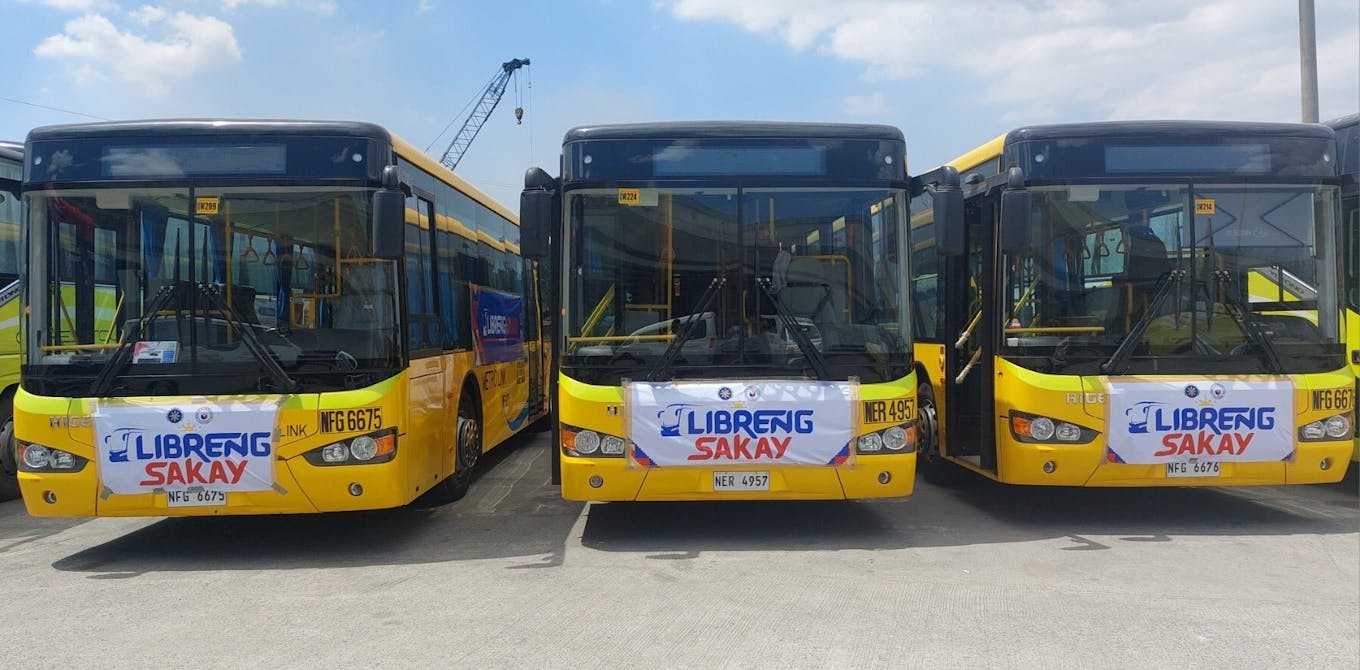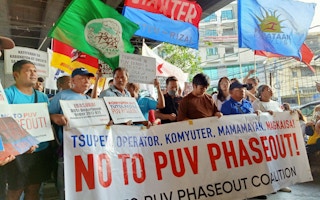Mario Secuya , 57 years old, has been driving a jeepney for more than three decades, but for the first time on Monday, he did not go on his usual route in Sucat, Parañaque, a highly urbanised city in Metro Manila, Philippines.
To continue reading, subscribe to Eco‑Business.
There's something for everyone. We offer a range of subscription plans.
- Access our stories and receive our Insights Weekly newsletter with the free EB Member plan.
- Unlock unlimited access to our content and archive with EB Circle.
- Publish your content with EB Premium.
Although he needed to earn his daily wage, his absence from the road was his way of taking part in a weeklong transportation strike, where an estimated 100,000 protesters of mostly jeepney drivers and operators across the country rallied against the public utility vehicle (PUV) modernisation programme.
Transport groups Manibela and Pinagkaisang Samahan ng mga Tsuper at Operator Nationwide (PISTON) announced on Tuesday evening they had ended their strike, after meeting with members of the Office of the President who said it would review provisions of the modernisation programme, including “hearing the grievances of our drivers and operators”.
Under the initiaitve, jeepneys 15 years or older, will be replaced with newer vehicles powered by low-emission Euro 4 engines, or produce no emissions at all, like electric jeepneys.
Jeepneys, an iconic mode of public transport based on old US military jeeps, are a crucial part of the commuting system, offering cheaper fares than trains, taxis or tricycles but have also been blamed for the country’s traffic congestion and air pollution.
“I don’t mind driving a new vehicle that will not emit pollution. But if I have to apply for a loan for it, I’d rather not because but I don’t want to be saddled with a huge debt,” Secuya told Eco-Business.

Jeepneys parked in their terminals as part of the strike on 6 March. The protest immobilised jeepney routes in Metro Manila and several regions nationwide by as much as 100 per cent, the Pagkakaisa ng mga Samahan ng Tsuper at Operator Nationwide (PISTON) reported. Image: Jilson Tiu/ Asean Skyline
Filipino public utility drivers are open to modernising the transport system but the government has not prepared them for a just transition, where their welfare is secured and prioritised in the move towards less pollutive air, according to sustainable mobility advocates.
“While the intentions are good, the key to a successful modernisation programme is providing a just transition for the drivers, where no one is left behind. The government should give support or compensation to affected livelihoods,” said Jedd Ugay, co-founder of AltMobility PH, a non-profit which advocates for sustainable and inclusive transport in the country.
The current programme focuses on “getting rid” of the old, iconic jeepneys with no regard to the interests of the vulnerable stakeholders affected by the shift like small and medium operators, and drivers who mostly live hand-to-mouth to survive, added Carlos Zarate, public transport sector policy reform advocate.
“The major issue here is really the cost of the shift – the cost of the modern, mostly imported, jeepneys that cost millions of pesos and are clearly beyond the reach of many operators,” Zarate told Eco-Business.
There are 5,300 modern PUVs plying the roads, which the department of transportation wants to increase by 50 per cent this year. But the government is only willing to subsidise about 5 per cent of the cost of modern vehicles that operate electrically or on more environment-friendly fuel within a range of US$44,000 to US$47,000 for each unit. A traditional jeepney costs only a fraction of this amount at US$3,600 to US$10,800. The government has also left out a PUV modernisation fund in this year’s national budget.
The Land Transportation Franchising and Regulatory Board (LTFRB), an agency under the department of transportation, gave a 30 June deadline for traditional jeepney drivers and operators to consolidate into a cooperative.
But the new guidelines require one cooperative to not only own one unit; they must run at least 10. Those who do not surrender their franchises and join a group will not be allowed to operate by July.

Free bus services have been prepared for stranded commuters on Monday, the first day of a weeklong transportation strike staged by jeepney drivers and operators against the public utility vehicle modernisation programme. Image: Office of the Speaker
Joining a cooperative means less take-home pay
Apart from the higher cost of the electric jeepneys, the modernisation programme will require operators and drivers to be part of a cooperative with a new employment structure where the income of jeepney drivers is standardised. Drivers will receive a mimimum wage and employment benefits such as social security and healthcare insurance. Drivers have set work hours, replacing the “boundary system”, which enables drivers to rent jeepneys from operators.
Secuya, who supports a family of four childen, said that if the scheme pushes through, it would mean that his daily take home pay would be about US$10, compared to earning double that amount if he remained in the boundary system.
Secuya said he would have to drive up to 16 hours a day to earn the higher wage, but he does not mind because it is sufficient to pay for his family’s needs.
For drivers like him who prefer not to be part of a cooperative, he said the government should at least provide alternative employment options.
“If they’re going to take my livelihood away from me, they should give me another type of work where I can earn the same amount that I’m used to. I know how to do welding and construction and could earn more doing both. They have to find me another means of earning a living,” he said.
Want more Philippines ESG and sustainability news and views? Subscribe to our Eco-Business Philippines newsletter here.

















